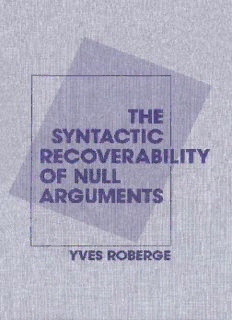
The Syntactic Recoverability of Null Arguments PDF
Preview The Syntactic Recoverability of Null Arguments
The Syntactic Recoverability of Null Arguments This page intentionally left blank The Syntactic Recoverability of Null Arguments YVES R O B E R GE McGill-Queen's University Press Kingston & Montreal • London • Buffalo © McGill-Queen's University Press 1990 ISBN 0-7735-0732-9 Legal deposit first quarter 1990 Bibliotheque nationale du Quebec Printed in Canada on acid-free paper This book has been published with the help of a grant from the Canadian Federation for the Humani- ties, using funds provided by the Social Sciences and Humanities Research Council of Canada. Canadian Cataloguing in Publication Data Roberge, Yves The syntactic recoverability of null arguments Includes bibliographical references. ISBN 0-7735-0732-9 1. Romance languages - Clitics. 2. Romance lan- guages - Topic and comment. 3. Romance languages - Grammar, Generative, 1. Title pc:191.C4R63 1990 440 089-090336-0 Contents Preface ix Introduction 3 1 SYNTACTIC THEORY AND NULL ARGUMENTS 1.0. Introduction 10 1.1. Variation and Learnability 10 1.1.1. The Government and Binding Framework 12 1.1.1.1. System of Rules 12 1.1.1.2. System of Principles 14 1.1.1.3. Interactions 18 1.2. Null Arguments 20 1.2.1. Previous Analyses 23 1.2.2. Zero-Topic Languages 26 1.2.3. A Theory of pro 29 1.3. On Empty Categories 31 1.4. Summary 34 2 NULL ARGUMENTS IN ROMANCE LANGUAGES 2.0. Introduction 35 2.1. A Generalization 36 vi Contents 2.2. Pro and Clitics 38 2.2.1. On pro 39 2.2.2. On Agreement 47 2.2.3. Subject Clitics and Object Clitics 52 2.2.4. Base Ceneration of Clitics 55 2.2.5. Case and -Role 65 2.3. On the Non-Existence of the Null Subject Parameter 67 2.4. Free Inversion 69 2.5. Causatives 78 2.6. Summary 83 3 ON CLITIC DOUBLING 3.0. Introduction 85 3.1. Subject Doubling 86 3.1.1. Northern Italian Dialects 86 3.1.2. Previous Analyses 87 3.1.3. French Dialects 90 3.1.3.1. Colloquial French go 3.1.3.2. Pied Noir French 97 3.1.4. Analysis 98 3.2. Object Doubling and Subject Doubling 103 3.2.1. Structures 104 3.2.2. Case Assignment 106 3.3. Extractions 117 3.3.1. The Facts 117 3.3.1.1. River Plate Spanish 117 3.3.1.2. Colloquial French 118 vii Contents 3.3.1.3. Pied Noir French 119 3.3.1.4. Trentino 121 3.3.1.5. Florentine 123 3.3.1.6. Romanian 124 3.3.1.7. Standard French 127 3.3.2. Summary 128 3.3.3. Previous Accounts 129 3.3.4. C-Chains 133 3.4. A Note on Complex Inversion 139 3.5. A Note on Reflexive se 145 3.6. Summary 150 4 CLITICS AND AGREEMENT MARKERS 4.0. Introduction 152 4.1. Subject Cliticization 153 4.1.1. Internal Structure of INFL 154 4.1.2. Verb Raising or INFL Lower- ing? 155 4.1.3. Coordination 158 4.2. Agreement Markers vs. Clitics 167 4.2.1. Coordination 169 4.2.2. Doubling 170 4.2.3. Extractions 172 4.2.4. Obligatoriness 172 4.2.5. Morphology 173 4.2.6. Conclusion 173 4.3. Historical Speculations 174 4.4. Summary 175 Conclusion 176 viii Contents Notes 181 Bibliography 201 Index 211 Preface This book studies the syntactic properties of subject and object clitic pronouns in several Romance languages and dialects from the per- spective of the Principles-and-Parameters framework in generative grammar, developed in recent work by Noam Chomsky and others. It analyzes the properties of languages with subject clitics, such as Standard French, and those with no subject clitics, such as Standard Italian, in a homogeneous way. It generalizes the same treatment to object clitics and to clitic-doubling constructions, achieving a unitary solution for many aspects of the syntax of Romance constructions which are at the center of recent debates. A comparative study of various, rarely discussed French dialects (Quebecois, Algerian), Italian, and Spanish dialects allows central claims to be made specifically concerning the null subject phenom- enon but also more generally with respect to syntactic theory. The inclusion of a wider range of data leads to the conclusion that French should be analyzed as a null subject language like many of its sisters in the Romance family and to a better understanding of the nature of the parameters responsible for the cross-linguistic variation found in syntactic constructions insolving clitic pronouns. This book is a revised version of my doctoral thesis written at the University of British Columbia. Revisions were also made based on the comments from three anonymous reviewers for the Aid to Schol- arly Publications Programme and McGill-Queen's whom I would like to thank. The work presented here has benefited from the contributions of many people. I would first like to express my gratitude to Michael Rochemont who has been of invaluable assistance for the two years I have worked on this book. I am also indebted to Guy Garden, David Ingram, Richard Kayne, Robert Levine, and Herve Curat for
Description: